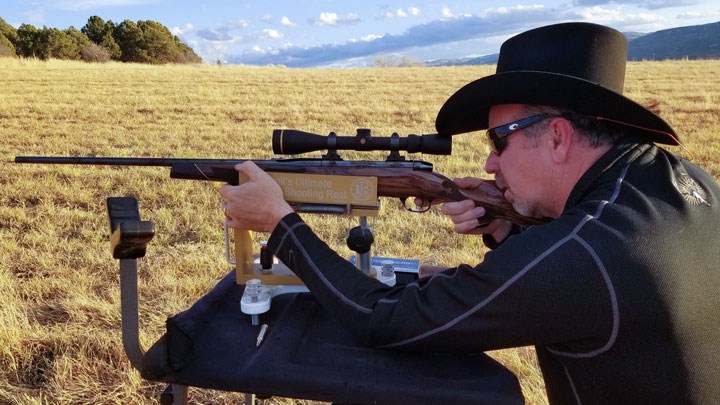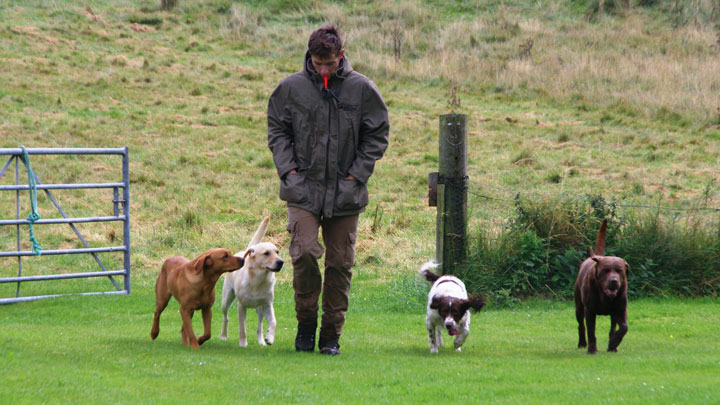
by Alan Peterson - Thursday, March 25, 2021

For many folks across the United States, the end of January brings the end of waterfowl season and most big-game seasons. Now we have the “grit-yer-teeth-n-bear-it” countdown before spring bear and turkey hunts. Rather than simply mope around in sackcloth and ashes, here are 10 things you can do during the off-season that will make next season’s hunts more productive and enjoyable.
We all have those too-painful-to-remember shots where we missed. We promise ourselves we will get in some practice, but there’s never time during the season. Now’s the time. Get out there and pattern your shotgun. Make sure your scopes and sights are zeroed—you never know when they’ve been bumped. It doesn’t take much to get better and put more game in the bag later this year. And never go alone to the range. Take somebody with you and introduce him or her to the fun of shooting and hunting.
Now is the time to clean them—butt to muzzle. My grandfather was a stickler for cleaning guns immediately after a hunt. With modern finishes and less corrosive powder formulations, it is easy to put “ol tick licker” away, rationalizing that you’ll clean her up later only to forget. So, break out the solvent and the gun oil and really go over your firearms, looking for any rust, cracks or other issues that could end a hunt or possibly cause injury if not addressed. If your scatterguns have removeable chokes, remove them. Make sure threads are clean and dry so that you don’t have a choke stuck fast when you need to make a quick change.
Go through all your gear to see what needs repairs or mending. Find the gear that you haven’t touched for several seasons and clear it out. Find an up-and-coming hunter who could use what you don’t and give him or her a leg up. Or sell it online and put the cash toward that upgrade you’re planning.
Clean, tune and practice. Put new cork in your duck call. Check your elk calls and make sure the diaphragms are in good shape. You will never reach a point where you have nothing else to learn about calling, be it cow elk or coyotes. Jump on YouTube for instruction on every imaginable nuance and secret to great calling. Don’t have time to practice? Yes, you do. I take a call or two with me in the car when I’m running errands. But, be prepared for some strange looks while sitting at traffic lights and stop signs.
Honestly, how many of us have dogs that are much better hunters than we are handlers? In-between-season-time gives us a chance to work on learning more about what our dogs already know. I am no expert but the two most important things I have learned are to set your dog up for success and to go slow. Even during those sessions where you are sure your dog has no brain between his ears, find an excuse to give her a task she can complete and that you can praise. Even if it’s just having her respond to a sit, heel or lie down command, find something praiseworthy and let your dog know she is the best dog in the world. You can work on the 100-yard blind retrieve again tomorrow. Some of the best advice I ever got was “two or three birds are better than 10.” Give your dog a chance to digest lessons. Don’t just keep piling on more. Maybe find just one behavioral issue, one additional skill, and consistently work on just that. Short, simple sessions are generally better than long sessions. Don’t create the expectation that you have to have a champion dog right now. You can enjoy the journey without worrying about the ultimate end manifesting itself today, this minute.

Your decoys don’t have to be the latest, greatest or newest. They don’t have to be perfect, but you can spend a couple of hours with a can or two of spray paint and have them looking much “duckier.” Individual feather definition isn’t as important as appropriate dominant colors that can be seen at a distance. A crisply painted set of black and white diver blocks can often be as effective as more subtly shaded “realistic” decoys—and since spray paint is cheap, you can afford to build a bigger spread. Don’t hesitate to add silhouettes to make your spread bigger. The off-season is the perfect time to cut out a couple dozen silos to add to your decoy bag. With an election year just past, plastic campaign signs may still be available for free. Just ask a campaign if you can have their signs for the price of gathering them up and saving someone else the task. A few minutes with a jigsaw and spray paint and you just expanded your rig!
If your significant other doesn’t hunt with you, then, let’s be honest, hunting season can be a strain. We talk about all we sacrifice to pursue our passions but it is the people who love us and stay behind holding down the home front while we’re gone that really make the sacrifices. Dedicate some time, sweat and energy to get those projects and chores done that you put off during the hunt. Build up some goodwill to get “hall passes” come hunting season.
Good hunting is safe hunting. As the NRA explains, safe hunting requires teachers and mentors. Be willing to take the time to get certified as an NRA instructor. The shooting world needs more people to hand down the safe skills necessary for successful interaction with firearms. Good teachers inspire the next generation and are the best insurance policy for a future with firearms.
As hunters, we know how important it is to recruit new folks into the sport. Now is the time to do something about it. Make a commitment to take someone hunting. Sure, it can be a hassle and you may need to change your mindset a little to make sure your guest has a good time. But the investment is worth it. That’s what it is: an investment in the future—yours theirs and ours.
Every waterfowl season, I get to sit in wetlands that I helped make better. I’ve helped to clean out canals, put up nesting structures and build habitat with a locally-focused conservation group called Wasatch Wigeons, which I’ve written about on this NRA Hunters’ Leadership Forum website. Nothing has added the kind of satisfaction and sense of accomplishment to my hunting experience as has volunteering and getting my hands dirty in the service of wildlife and its habitat. Every state fish and game department needs your help. Every area has local chapters of Ducks Unlimited, Delta Waterfowl, the National Wild Turkey Federation, the Rocky Mountain Elk Foundation, Pheasants Forever—the list goes on. There is never enough money or volunteers to accomplish everything that needs to be done. In my humble opinion, no one should be (and typically no one is) more involved with conservation than hunters. No one has more to gain or more to lose. If you want to meet great people and make a difference, get involved. Then you can share the sense of pride with me and millions of others who make sure that there will be a future for wild things and wild places.
So … put down the remote. Tear yourself away from the Internet. Don’t let this off-season go to waste.
E-mail your comments/questions about this site to:
[email protected]
